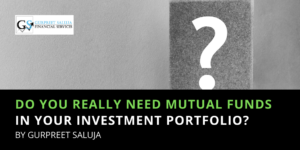Do You Really Need Mutual Funds In Your Investment Portfolio?

Now, you may be investing in mutual funds for a long time or planning to invest in them but you must know this, do you really need mutual funds?
You need Mutual Funds in your Investment Portfolio only if you are from one of the following three categories:
- You are currently working and planning to retire sometime in the future.
- You are already retired and dependent on the income generated by your investments.
- You are the one who pays high taxes (in 30% tax slab).
Let’s discuss in more detail about these three categories.
Planning To Retire
You are currently working in your business or profession and you have serious thoughts about your retirement life, therefore you are continuously planning about your retirement.
As you are planning to retire sometime in the future, you would need a retirement corpus to survive, investments that can earn you a living post-retirement.
How much corpus you should have, is equally proportional to how long you are going live post-retirement? As medical science is advancing very fast, your life span can be more than 90 years or maybe 100 years.
You need to plan your corpus accordingly. So, to create your corpus you need to look around investments that generate you returns higher than bank deposits in that case you are left with options like stocks and real estate only.
To manage a stocks portfolio as well as a real estate portfolio, you are required to have professional expertise.
To have such expertise, mutual funds are one of the best options available. Currently, there are no real estate funds in India, so equity funds are a viable option – That would be the best choice for you to create your retirement corpus.
Retired
Retired people don’t have the advantage of taking high risks by investing in equity or equity funds therefore they tend to invest in debt instruments like bank deposits all their life and earn a fixed return.
But as with the time, the living expenses don’t remain the same neither the returns on bank deposits this makes the life of a retired person miserable and challenging if his or her life span increases by another 5 or 10 years than expected. These years could turn into a nightmare if not planned accordingly.
It is advisable to invest in open-ended debt funds during this stage to have an advantage of falling interest rates in the long run as well as mix it with a little slice of equity funds to make your corpus sustainable even if living expenses increases in the long run or life span increases than earlier planned.
Paying High Tax Rate
Any of you whether retired or planning to retire, if you are in the highest tax slab then investment products like bank deposits will not be viable options for you as the tax will eat out the returns you earn from these investments and your corpus can’t be sustained longer if it doesn’t beat inflation after paying taxes.
The options that are currently viable for you are Open-Ended Debt Funds & PPF because of their tax-efficient nature. The only disadvantage of PPF is its limit of investments, you can’t invest more than Rs 1.5 Lakhs in a Financial Year.
Therefore Open Ended Debt Funds presents an interesting alternative as they are highly liquid and don’t have any investment restrictions.
Though Open-ended debt funds score lower than PPF on tax efficiency still debt funds are better options as compare to other debt instruments currently available.
Tax benefits also come in two forms, rate of tax & ability to defer the payment of tax until you withdraw the investment. Open-end debt funds offer you both these benefits as compared to other debt instruments.
Secondly, In case of the accumulation phase of your corpus with the use of equity mutual funds, they also offer very tax-efficient returns for you as you have to pay lower tax rates than your tax slab along with the ability to defer the payment of tax until you withdraw.
I hope this would help you to dig deeper into your need for mutual funds in your investment portfolio.
I will come up with more interesting articles related to mutual funds, so don’t forget to subscribe to my weekly newsletter below.

Hi, I’m Managing Director at Gurpreet Saluja Financial Services Pvt. Ltd. Where I help my investors to invest in mutual funds and achieve their financial goals. I’m also a Value Investor and here I write about Personal Finance & Investing.

